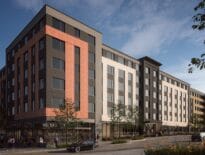
Josh Zakim
As Boston enters the final stretch of a historic mayoral race, the city’s voters have made it clear that housing is a top issue in this election. However, the most attention-grabbing proposed housing policies tend to be ones that require changes to state law, a task that is never easy and, even if successful, would likely take years, like rent control, tenant opportunity to purchase and overhauls of the Boston Planning & Development Agency.
Yet, the powers of the mayor’s office include many revenue-neutral policy tools that allow any new Boston mayor to take substantive action on housing from day one. Voters who care about making Boston a more affordable place to live should consider how each candidate plans to leverage these tools to make progress on the city’s affordability goals without delay.
Boston’s next mayor will inherit a housing shortage decades in the making. The COVID-19 pandemic highlighted the city’s housing challenges, but today’s soaring home costs are the culmination of years of insufficient housing construction while the population increased dramatically. A report released last month by Gov. Charlie Baker’s administration notes that in 2019, well before the pandemic, “Massachusetts had the most saturated residential market in the US,” meaning in addition to high property values it had “the lowest vacancy rates for both rental and homeowner properties” in the country.

Kyndal Feinman
To sustainably address Boston’s housing crisis and ensure the city’s long-term viability, voters must choose a leader who will move with urgency to bring the city’s housing supply in line with current – and future – demand.
A Realistic Agenda for Boston
The call for new homes may sound familiar to Bostonians; former mayor Marty Walsh made reducing the city’s housing shortage a policy priority throughout his two terms. Upon taking office, he swiftly convened a housing task force that released a plan in 2014 titled “Housing a Changing City: Boston 2030.” Emphasizing the connection between an escalating need for subsidized affordable options and the severe lack of homes for Boston’s growing population, the plan initially identified a need of 53,000 additional homes above the city’s 2013 baseline by 2030.
Yet, even with the Walsh administration’s commitment to building more, the city’s population grew significantly faster than predicted and continued to outpace construction. In 2018, the city released an update to its housing plan that increased the number of new homes needed by 2030 to 69,000. Despite the former administration’s impressive gains in housing production, the work is far from over: by the end of 2020 the city had permitted just 35,955 homes.
To meet the city’s housing needs the next mayor will need to draw on all possible policy levers to increase the current pace of production throughout the remainder of the decade.
Earlier this summer, Housing Forward-MA released a report that outlines a potential housing production strategy using policy tools within the mayor’s direct influence. These include: updating Boston’s Zoning Code to prioritize “missing middle” development; increasing city staff to accelerate permit application review; enacting policies that increase incentives and reduce costs for affordable developers; appointing pro-housing members to the Zoning Commission and Zoning Board of Appeal; partnering with leaders of local institutions to provide housing for the city’s young professional workforce; and tracking and allowing real-time public access to the city’s housing production metrics.
Though neither headline-grabbing nor silver bullet solutions, policies that utilize these tools – such as reducing mandatory parking minimums, re-legalizing triple-deckers, and allowing accessory dwelling units (also called “in-law apartments”) by-right – are effective ways for the city to address the root of our housing challenges without having to wait for action from the State House.
City’s Future Can’t Wait
While Greater Boston residents may experience the high costs of housing scarcity more acutely, the city is not alone in grappling with these issues.
One estimate found that in 2018 the country was 2.5 million homes short of meeting demand; by 2020, that number had already expanded to 3.8 million. This has led to a growing movement across the country by local leaders to end exclusionary zoning practices: Minneapolis, Minnesota ended exclusive single-family zoning in 2018; Buffalo, New York cut mandatory minimum parking requirements in 2017; and a number of cities and states are working to make accessory dwelling units easier to build. Boston should be a leader in these efforts.
Voters should look closely at how each candidate would use the powers of the mayor’s office to create more homes, of all shapes and sizes, and affordable across income levels. While advocating for state-level policy changes can be a piece of the puzzle, there are many actions the mayor of Boston can take immediately in City Hall.
If creating more housing is not one of the top priorities for the next mayor, the city’s prosperous, diverse future will be in jeopardy. Boston does not have time to wait.
Josh Zakim is executive director and Kyndal Feinman is director of policy & external relations at Housing Forward-MA, a nonpartisan nonprofit dedicated to educating Massachusetts residents and elected officials about housing policy solutions. Zakim is a former Boston city councilor.





